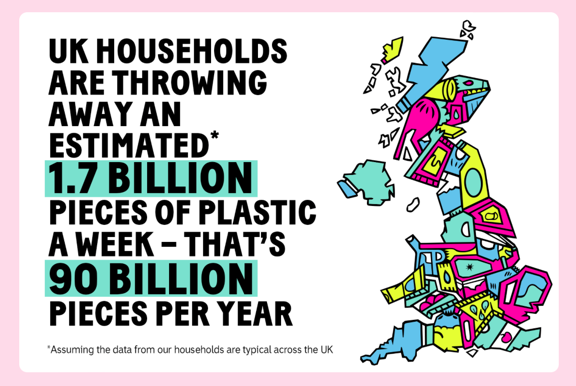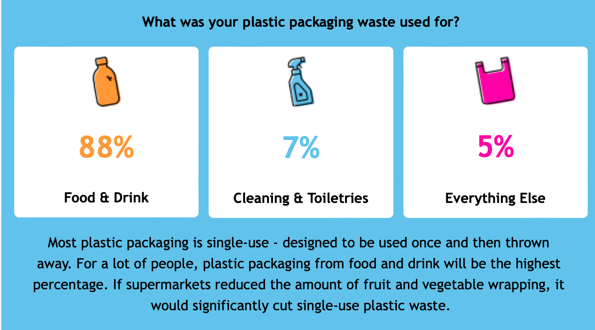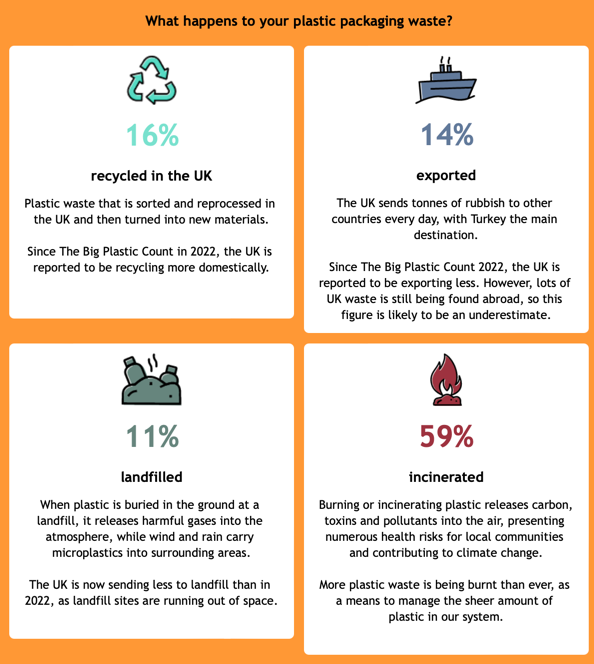
Remember the Big Plastic Count 2024 back in March? My personal results, with my households plastic packaging footprint, and the overall results are in, from 225,000 participants. And they are STAGGERING.
Such a lot of data to crunch and analyse. Were there enough contributors to get credible results I can hear you ask? Well, participation was 1 in every 300 people in the UK – that seems a significant enough number to give a pretty good overview of not just how much plastic households are throwing away, but in which categories.
Can you guess which of these had the highest plastic count: Food & Drink, Cleaning & Toiletries and Everything Else? Any idea how much of our plastic is incinerated?
Too much plastic is being produced by our supermarkets and big brands, with actually very little choice for many of us about what our food and essential supplies are wrapped in. Important to note, the vast majority of medicine comes in single-use plastic, so these and any single-use plastics required for the well being of those with disabilities were not included in this count.
My Personal Plastic Footprint Packaging
In one week, we used 58 pieces of plastic, equivalent to 3,016 in a year! Here’s the breakdown by category.

It’s probably not surprising that Food & Drink is where we have most single use plastics in the UK. Interestingly for me, 52% was hard recyclable plastic, with 48% soft. Can you believed I thought not having clingfilm in the house would mean reduced soft plastic waste! What I hadn’t understood was how much is incinerated – that means carbon and other toxins are released into the air we breathe.

What About UK Results?
Based on the assumption that the data collected during the count was typical for most households 1.7 billion pieces of plastic, per week are being thrown away in the UK!
The UK tops the charts for plastic waste per person globally – second only to the US.
The Big Plastic Count
On top of that, looking back at 2022’s count in comparison to 2024’s, more plastic is being incinerated with an increase from 46% to 58% – that is here, in the UK, into our atmosphere.
More carbon dioxide per tonne than burning coal is released into the atmosphere from plastic incineration. Did you know that? I didn’t! Read all the results HERE
What About Recycling?
Only about 17% of our plastic is being recycled. Why? The volume we are producing we just can’t handle. Plastic can only be recycled a few times, before the only option is to incinerate, add to landfill or export it to another country.
Even the process used for recycling puts microplastics into our water and air – it’s no wonder we are finding so much in our oceans, the fish and the food we are eating.
Do you enjoy my writing?: Always optional, Donating even a small amount occasionally enables me to continue to be another voice for the environment, supporting organisations focussed on conservation and restoration through my blogs, video’s, giving my time on committees, raising awareness. Click on the Donate button, top right hand side of the page for more information on how I am contributing and why your donation counts.
What Can We Do?
Governments have just started negotiations with the UN for a Global Plastics Treaty. If successful, it will set global targets to reduce plastic production. Let’s hope it’s successful and doesn’t take too long! Interestingly, the UN Global Oceans Treaty, a pact to conserve biodiversity on the high seas was signed initially by 67 countries – a step in the right direction to reverse damage to fragile marine environments by over fishing and human activities. It will need to be ratified by each of those nations. It’s a powerful signal which has the potential to make 30% of our oceans conservation areas by 2030 and has shown that both individuals and organisations pushing for these changes can succeed.
Back to the plastics issue, you can email your MP and this handy LINK shows you how.
Making changes to your shopping habits isn’t always easy, but there are some good tips and other useful actions you can take HERE. If EVERY SINGLE ONE of us reduced our plastic waste each week, collectively it will have an impact. Give it your best shot, do it for your own health and the health of our planet.
